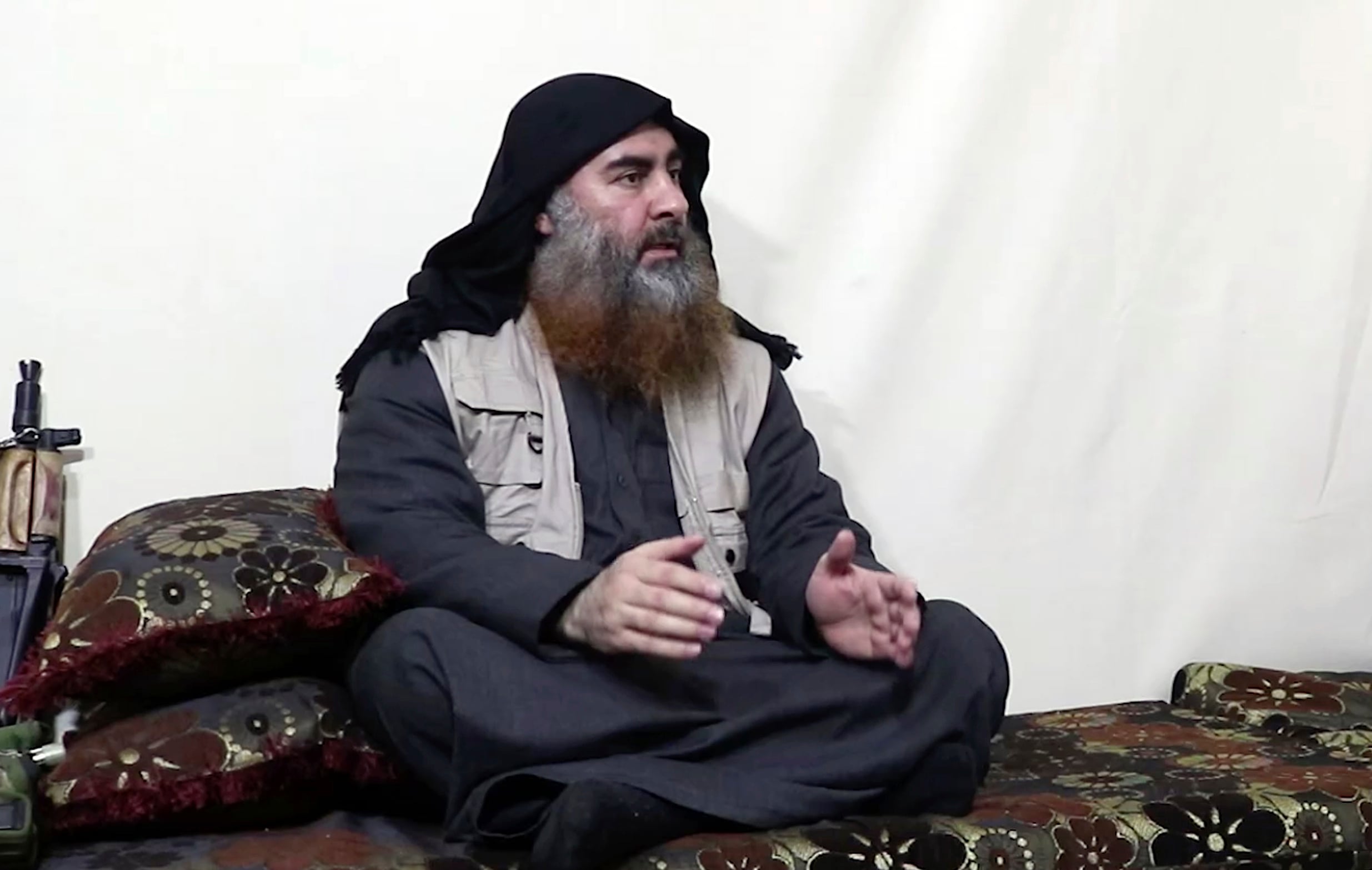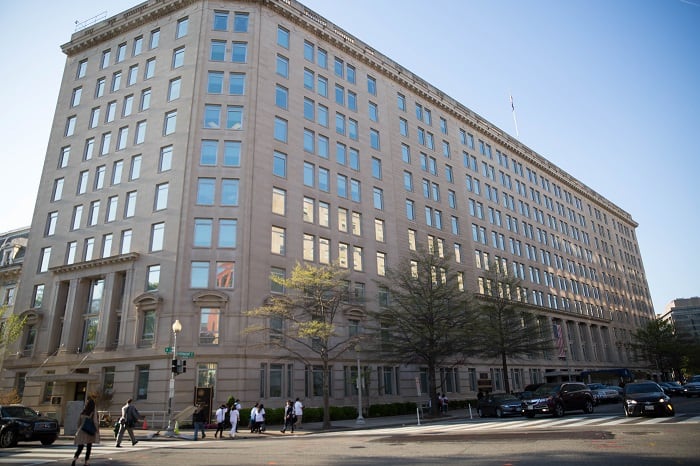Update: In a White House announcement, President Donald Trump said that ISIS leader Abu Bakr al-Baghdadi was killed in a U.S. commando raid.
“Last night US brought the world’s No. 1 terrorist leader to justice,” Trump said. “Abu Bakr Baghdadi is dead.”
“He died like a dog,” said Trump. “He died like a coward.”
Abu Bakr al-Baghdadi, the leader of the Islamic State jihadi group who created a short-lived caliphate in Syria and Iraq, is believed dead after being targeted by a U.S. military raid in Syria, Military Times has confirmed.
A Defense Department official told Military Times late Saturday that al-Baghdadi, one of the world’s most wanted men, was targeted upon orders from President Donald Trump and that he was believed to have been killed. However, the Defense Department official said the military is still awaiting confirmation of al-Baghdadi’s death from DNA testing.
The raid occurred in Syria’s Idlib province, according to the Associated Press.
Trump approved the mission nearly a week before it took place, according to Newsweek, which was the first to report the raid.
It appears that al-Baghdadi detonated a suicide vest during the raid, CNN reported. The CIA assisted in locating the ISIS leader, a defense official told CNN.
A source in the region told Military Times that he saw a Delta Force task force launched aircraft from near Ain Issa, Syria, around 2 a.m. local time Friday.
President Donald Trump teased a major announcement, tweeting Saturday night that "Something very big has just happened!"
A White House spokesman, Hogan Gidley, told the AP that the president would be making a “major statement” at 9 a.m. EDT Sunday.
A senior Iraqi security official told the AP that Iraqi intelligence played a part in the operation. Al-Baghdadi and his wife detonated explosive vests they were wearing during the U.S. commando operation, according to the official, who was not authorized to publicly discuss the sensitive information and spoke on condition of anonymity. He added that other IS leaders were killed in the attack.
If confirmed, the operation's success could prove a major boost for Trump. The recent pullback of U.S. troops he ordered from northeastern Syria raised a storm of bipartisan criticism in Washington that the militant group could regain strength after it had lost vast stretches of territory it had once controlled.
The Syrian Observatory for Human Rights, a Syria war monitor, reported an attack carried out by a squadron of eight helicopters accompanied by a warplane belonging to the international coalition on positions of the Hurras al-Deen, an al-Qaida-linked group, in the Barisha area north of Idlib city, after midnight on Saturday. IS operatives were believed to be hiding in the area, it said, according to the AP.
It said the helicopters targeted IS positions with heavy strikes for about 120 minutes, during which jihadists fired at the aircraft with heavy weapons. The Britain-based Observatory, which operates through a network of activists on the ground, documented the death of 9 people as a result of the coalition helicopter attack. It was not immediately known whether al-Baghdadi was one of them, it said, according to the AP.
Al-Baghdadi’s presence in the village, a few kilometers from the Turkish border, would come as a surprise, even if some IS leaders are believed to have fled to Idlib after losing their last sliver of territory in Syria to U.S.-allied Kurdish forces in March, according to the AP. The surrounding areas are largely controlled by an IS rival, the al-Qaida-linked Hayat Tahrir al-Sham, or HTS, although other jihadi groups sympathetic to IS operate there. Unverified video circulated online by Syrian groups appeared to support the Observatory claim that the operation occurred in Barisha, according to the AP.
The intelligence source on the militant leader’s whereabouts could not be immediately confirmed, but both Iraqi and Kurdish officials claimed a role, according to the AP. The Turkish military also tweeted that before the operation in Idlib, it exchanged “information” and coordinated with U.S. military authorities.
Kurdish forces appeared ready to portray al-Baghdadi's death as a joint victory for their faltering alliance with the U.S., weeks after Trump ordered American forces to withdraw from northeastern Syria, all but abandoning Washington's allies to a wide-ranging Turkish assault.
The commander of the Kurdish-led Syrian Democratic Forces, Mazloum Abdi, tweeted: “Successful& historical operation due to a joint intelligence work with the United States of America.”
Previous reports about the death of al-Baghdadi have proved to be exaggerated greatly.
In June the Russian defense ministry claimed it had killed Baghdadi in an airstrike near Raqqa in May. Raqqa was the terror group’s de-facto headquarters in Syria.
U.S. officials weren’t buying that.
“I think Baghdadi’s alive,” Mattis told reporters at the Pentagon at the time.
Mattis declined to say why he thought Baghdadi is still alive. Barring evidence that he has continued to be engaged in the command and control of the organization, the ISIS leader may have assumed a different role, Mattis suggested, such as a spiritual or propaganda leader within ISIS.
“Until I see his body I am going to assume he is alive,” Mattis said at the time.
It would be more than two years before al-Baghdadi was heard from publicly again.
In April, the shadowy leader appeared for the first time in five years in a video released by the extremist group’s propaganda arm, acknowledging defeat in the group’s last stronghold in Syria but vowing a “long battle” ahead.
The SITE Intelligence group said al-Baghdadi, in the video, also discussed the Easter Day bombings in Sri Lanka which killed over 250 people and for which the group claimed responsibility.
The video released by Al-Furqan at the time shows al-Baghdadi with a bushy grey and red beard, wearing a black robe with a beige vest and seated on the floor with what appears to be a rifle propped up next to him. He is speaking with three men seated opposite him whose faces were covered and blotted out.
This is a developing story. Stay with Military Times for updates.
Howard Altman is an award-winning editor and reporter who was previously the military reporter for the Tampa Bay Times and before that the Tampa Tribune, where he covered USCENTCOM, USSOCOM and SOF writ large among many other topics.




